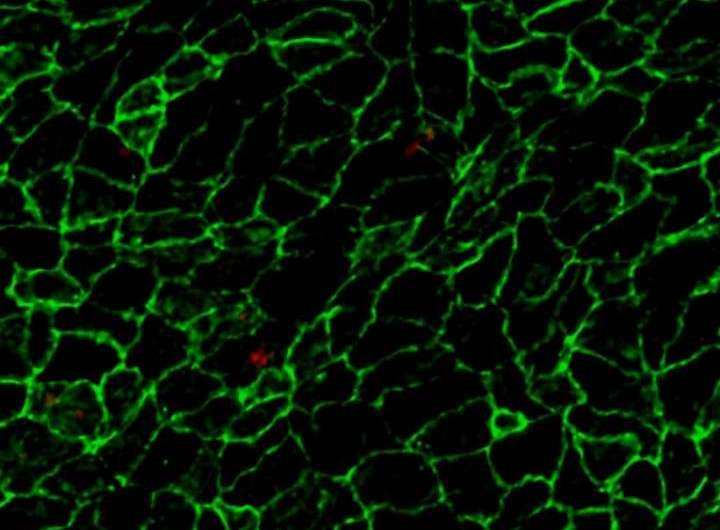Blocking a protein could improve the effectiveness of intravascular cellular 'policing'

Researchers at the Centro Nacional de Investigaciones Cardiovasculares Carlos III (CNIC), led by Dr. Alicia G. Arroyo, have identified a function of a protease that could be targeted for the treatment of some infections and even tumor metastasis. The study, published today in Nature Communications shows that blockade of the protease MT4-MMP increases the surveillance activity of a type of white blood cell in the circulation, the blood-patrolling monocytes. These cells act like 'police patrols' to detect foreign or undesired material in the blood. The findings, according to Dr. Alicia G Arroyo, "have possible clinical implications and could contribute to strategies to eliminate foreign or undesired materials from the blood, such as infectious agents or tumor cells." The study thus suggests new strategies to combat infection or prevent metastasis, which are currently being evaluated for patent protection.
The immune system circulates leukocytes (white blood cells) with specialized functions. One population consists of inflammatory monocytes that are released rapidly in response to injury and generate an immune response at the injury site. But there is another monocyte population tasked with the surveillance of the blood-vessel interior, giving rise to the name blood-patrolling monocytes. These monocytes rarely migrate to sites of tissue injury, and therefore, their role in inflammation is less known.
Now, in the Nature Communications study, the CNIC team reports an in-depth analysis of the function of patrolling monocytes in inflammatory disease, and the mechanisms that regulate their vascular surveillance activity. As a model, the researchers studied the inflammatory process of atherosclerosis. In atherosclerosis, the injury signal is triggered by the deposition of cholesterol, which induces the migration of inflammatory monocytes and, to a lesser extent, patrolling monocytes. Once in the vessel wall, the monocytes differentiate to macrophages, which are specialized in 'engulfing' injurious material such as the accumulated cholesterol.
First author Cristina Clemente says, "The first things we observed were that early atherosclerotic plaques in mice lacking MT4-MMP accumulated more macrophages and that atherosclerosis was accelerated when these mice were fed a high-fat diet."
The researcher also observed that early lesions in mice lacking MT4-MMP selectively accumulated more patrolling monocytes, whereas inflammatory monocytes were recruited as normal. Clemente says, "Macrophages derived from the patrolling monocytes incorporated more fat and showed better survival than those derived from inflammatory monocytes."
But when the MT4-MMP-deficient mice were treated with the CCR5 inhibitor Maraviroc, used to treat patients with HIV, the migration of patrolling monocytes to atherosclerotic plaques was blocked, preventing the macrophage accumulation and accelerated atherosclerosis. Thus, blockade of MT4-MMP in early phases promotes atherosclerosis, but at the same time, could potentiate the response to treatments to combat infection or prevent metastasis. However, Dr. Arroyo says, "We don't know if this acceleration of atherosclerosis is maintained at later stages, and this is something that will need to be analyzed.
The authors also identified that MT4-MMP can cut integrin αM, a crucial leukocyte adhesion receptor. Thus, in the absence of the protease, this receptor accumulates on the surface of patrolling monocytes. Through collaboration with CNIC colleague Cristina Rus, the research team used intravital microscopy to visualize the surveillance activity of patrolling monocytes, detecting increased numbers of these cells in inflamed vessels of mice lacking MT4-MMP.
More information: Cristina Clemente et al, MT4-MMP deficiency increases patrolling monocyte recruitment to early lesions and accelerates atherosclerosis, Nature Communications (2018). DOI: 10.1038/s41467-018-03351-4


















